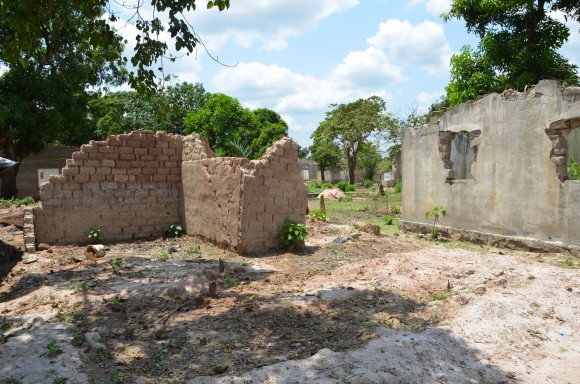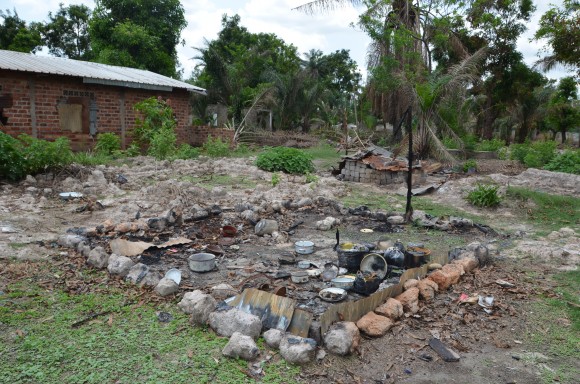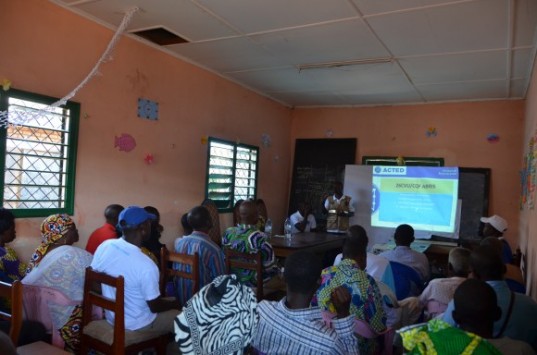The 2013 crisis forced many families out of the capital, Bangui. Many displaced families found refuge in M’Poko IDP site, near the Bangui airport, which hosted more than 40,000 people until recently.
Since the beginning of 2017, more and more people started to return to their neighborhoods in Bangui. Since the M’Poko site closed in last February, return movements are increasing. In neighborhoods where infrastructure is already scarce, return movements are likely to create a significant pressure, while affecting social cohesion. ACTED is mobilised to provide support to returnees, especially in the 3rd district of Bangui. In January 2017, ACTED launched a new project to support the 17,500 returnees in the 3rd district to support the reconstruction of destroyed houses, improve access to water and sanitation and promote social cohesion.

Recently, in March 2017, the ACTED team met with the local representatives (Mayor, councilors, heads of districts, chiefdoms, local associations) of the 3rd district to present the main objectives of the project, the criteria on which the beneficiaries will be selected and the timetable for implementation. For ACTED, meeting local authorities and community leaders is a necessary first step before starting activities. This type of discussion ensures the full understanding and support of the authorities, which will facilitate ACTED’s interventions on the field. All have shown their willingness to restore peace and security and actively support this reconstruction project.
Meeting the growing needs of returnees
Several levels of intervention will be needed to enable returnees to regain a stable life in their neighborhood of origin. Many families lost their home, either destroyed during conflicts, or damaged and no longer inhabitable. Some 600 of the most vulnerable families will benefit from training on reparation and reconstruction of shelters and vouchers that will allow them to acquire construction or repair materials. Beyond single-family homes, community infrastructure was also damaged or destroyed, thus compromising access to water and sanitation. Beyond a roof over their head, families will need access to safe water to drink, wash and cook. ACTED already identified the wells that will need to be repaired to restore access to water. Gutters will be cleaned to prevent the spread of diseases such as malaria, cholera or typhoid, and to prevent floods during the next rainy season.

To carry out this work, ACTED will hire unemployed youth and women through cash-for-work activities. The temporary income they will receive will allow them to feed their families or to invest in income generating activities.

A major issue of return is also the social cohesion of populations from different communities and ethnic groups. ACTED will set up dialogue sessions in the neighborhoods to settle potential conflicts that may arise between the families. Community infrastructures and facilities will also be rehabilitated to contribute to limiting potential conflicts and strengthening social cohesion.

Since 2014, ACTED has been supported by the European Union Humanitarian Aid Department (ECHO) to support displaced families who wish to return to their home and participate in the improvement of the living conditions of the populations in their neighborhoods of origin, while limiting the intercommunity tensions.
 This document covers humanitarian aid activities implemented with the financial assistance of the European Union. The views expressed herein should not be taken, in any way, to reflect the official opinion of the European Union, and the European Commission is not responsible for any use that may be made of the information it contains.
This document covers humanitarian aid activities implemented with the financial assistance of the European Union. The views expressed herein should not be taken, in any way, to reflect the official opinion of the European Union, and the European Commission is not responsible for any use that may be made of the information it contains.